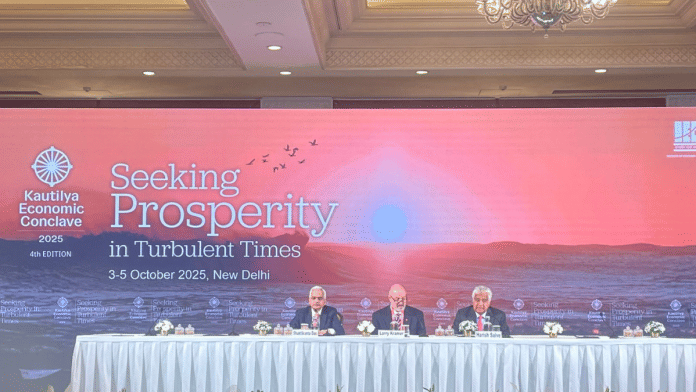New Delhi: Former Solicitor General of India Harish Salve called for more foreign investments to fuel India’s economic growth at the fourth edition of the Kautilya Economic Conclave at Taj Palace, New Delhi Friday, adding that the only way India can be true to the preamble of the Constitution is through the vehicle of economic growth.
“India needs roughly three trillion dollars of infrastructure finance in the next few years through private equity,” said Salve, dissecting the issues that plague India’s legal system as part of a panel on ‘Reforming the Legal Architecture’. “Will private equity come to a legal system which doesn’t guarantee speed or certainty?”
Moderated by Shaktikanta Das, Principal Secretary to Prime Minister Narendra Modi, the panel also included Larry Kramer, President and Vice-Chancellor, London School of Economics and Political Science.
To further explain his point about foreign investment, Salve said that cases need to be resolved within relatively short, defined timelines, and that they cannot be decided based on a judge’s personal opinions. Foreign investors, especially in highly regulated spaces like infrastructure finance, expect quick and fair resolutions.
“Improving the justice delivery system is not a question of spending $300 million or $500 million more on judges’ salaries,” said Salve. “It is reducing the risk of investment in India. And then we are talking of billions of dollars saved by a small investment in the justice delivery system.”
Also Read: Jaishankar on trade deal with US—compromises needed on both ends, but India has ‘certain red lines’
An ideal judicial system
Kramer began by highlighting the salient features of a solid legal system, including access to quick justice, no corruption, independence of the judiciary and accountability. He added that despite all that, vast differences can arise in the quality of justice delivered.
He contrasted the US federal and state courts, noting that while federal courts are perceived as “highly prestigious and attractive”, lower state courts are not.
“There is a massive difference in the quality of the judges and the quality of adjudications that you get,” said Kramer, before underscoring the importance of balancing independence with accountability. “You have to worry about a court that is too independent of the political system as much as you have to worry about a court that is too dependent on it.”
To achieve this balance, Kramer suggested different methods that can be implemented, the first being that judges can be independent in their rulings, but the institution can remain accountable through staggered political appointments or fixed terms.
“That’s just one mechanism that can be used for ensuring the independence of the judges in deciding cases, but making sure that the bench can’t get completely out of sync with where the rest of the political system in the country is.”
Kramer also highlighted the importance of a disciplinary system that should not be controlled entirely by politicians or judges but jointly overseen.
He added that there is a need to stay away from the notion of direct political control, but also the notion of complete judicial independence, saying, “It’s important to think about achieving that kind of mix of independence and accountability in terms of how you are going to control the bench once it’s there.”
Kramer stressed the need for ongoing judicial training, both for judges and administrators. To him, these are the kind of structures that make courts attractive, especially at a time when international mediation organisations have lost credibility; these kinds of reforms to the legal system would only attract foreign investment.
Call for more judicial appointments
Salve also highlighted the specific areas where reform was paramount. The first was around resolving commercial disputes, which take anywhere between 12 and 18 months.
“If somebody looks at the cause list of the Bombay High Court, suits there have been lingering for decades,” said Salve, adding that a significant increase in judges is required to hear cases. “They (Bombay HC) have four judges hearing cases. They barely get to finish their ex-party and interim applications.”
For an increase in judges, attracting legal talent becomes important for Salve. He highlighted how India aspires to have 50 judges per million population, below the average of 90-100 in more developed countries.
“If you go out of Delhi and Bombay, and you go to the courts of first instance—district judges—those courtrooms have empty chairs,” he said, adding that legal talent is not willing to come and join the system. “There has to be a salary which attracts you to a job.”
He added that members of the district forum earn Rs 10,000, slightly less than what he paid his chauffeur. Subsequently, Salve called for a commission to investigate the salary level required to attract talent.
“All good commercial courts in the world have come to terms with domain expertise… They (the government) have given us the Commercial Courts Act and the Arbitration Act. Why is it not working? Because we people don’t let it work.”
Salve explained that only the nameplate of a court has changed. The same judge, the same court, has now become a commercial court, and that was not what the Acts were meant for. “The time may be right for an all-India judicial service for commercial courts.”
Salve also touched upon a few points that Kramer brought up—including continuing legal education even for Supreme Court judges—saying, “A lawyer is a student all of life.” He also pointed out that there are provisions in the Constitution to appoint temporary judges or recall retired judges to fix short-term problems.
“We have to come to terms that our judicial system is facing a crisis of confidence when it comes to commercial dispute resolution,” said Salve. “The government has given us a very modern arbitration law. Does it work in India? I don’t think so.”
(Edited by Insha Jalil Waziri)
Also Read: Reform or redundancy? A breakdown of DAKSH report on state of commercial tribunals in India







Indian politicians want to grow with socialism, and 100 years for every court case disposal.